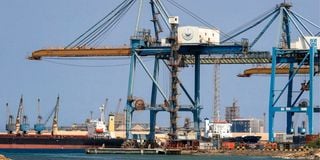Sudan cancels port deal with UAE in subtle protest at Abu Dhabi

Sudan has cancelled a port deal with the United Arab Emirates in an apparent protest at Abu Dhabi for its supposed support for the Rapid Support Forces, the paramilitary engaged in a deadly conflict with government forces.
Finance Minister, Jibril Ibrahim said his country had cancelled a memorandum of understanding with the United Arab Emirates (UAE) regarding the establishment of the Abu Amama port on the Red Sea coast.
Ibrahim said Khartoum was dropping the deal because it was not legally binding for Sudan and said the move would protect Sudan’s sovereignty.
At a press conference in Port Sudan, he asserted that Sudan would not cede “one centimetre” of its coastline to the UAE. This decision comes amid growing accusations that Abu Dhabi has been providing support to the Rapid Support Forces (RSF), which have been embroiled in conflict against the Sudanese military since April 2023.
The cancellation of the Abu Amama deal may also be a political maneuver aimed at curtailing UAE’s influence in Sudan, particularly given the accusations surrounding its support for the RSF. This decision signals a shift in Sudan’s foreign policy, emphasising a desire to assert national autonomy and resist external pressures amidst ongoing regional tensions.
The relationship between Sudan and the UAE has been complex, marked by both cooperation and tensions in the recent past.
Signed in December 2022 between the Sudanese government and Abu Dhabi’s ports authority, alongside the Sudanese businessman Osama Dawood’s investment firm, it was aimed to develop the Abu Amama port with investments worth $6 billion, which included a free trade zone and agricultural projects.
The abrupt cancellation indicates a reassessment of this partnership in light of the current political landscape.
Residents welcome move
Residents of eastern Sudan, particularly in Port Sudan, have largely welcomed the cancellation of the project.
They hope that the government will focus on developing local infrastructure and creating job opportunities. The community seeks genuine investments that prioritise local benefits over large-scale foreign-managed projects, which they fear could undermine local economies.
Domestically, this decision may pose challenges for the Sudanese government as it navigates the complex landscape of political factions.
Different groups hold varying views on relations with the UAE and other foreign nations, necessitating a balanced approach to policy-making that promotes national unity while addressing the concerns of diverse political entities.
But the decision comes at a time when Sudan is facing a deepening humanitarian crisis. With soaring inflation, currency devaluation, and escalating prices, living conditions for many Sudanese have deteriorated significantly.
The government’s appeal for increased international humanitarian assistance is urgent, as the ongoing conflict has severely impacted the population’s well-being. At least 18,000 people have been killed, 11 million displaced and two million forced to seek refuge outside Sudan.
Those displaced have faced conditions nearing famine and also endured sexual violence and attacks from warring factions, according to aid agencies.
The cancellation of the port agreement has implications beyond Sudan’s borders, however, particularly in relation to regional powers like Saudi Arabia and Egypt, which also have interests in the Red Sea.
This situation highlights the delicate balance of power in the region, where Sudan must navigate international influences carefully.
Looking ahead, Sudan faces both challenges and opportunities. By asserting its political stance and limiting external influences, the country may stabilise its governance and restore confidence in its sovereignty.
Engaging with international organisations and prioritising humanitarian assistance will be crucial for fostering long-term stability and recovery.





